C. Lee McKenzie's Blog, page 5
January 1, 2025
Short Story Wednesday

Happy New Year Dear Readers,
It’s a new year, and here we go again. I plan to continue posting short or serialized fiction with an occasional venture into the realm of the real. I appreciate anyone who gives me their time—the most valuable commodity humans have to spend while visiting Earth. If you like what I write, please tell me. If you don’t…well, you’ll soon find other places to spend those precious reading moments, and I wish you well.
I originally wrote The Lynching for a Write It. Edit It. Publish It (WEP) contest a couple of years ago. Since then, I edited it a bit, so here’s the latest version.
I’ve always enjoyed slice-of-life stories, especially ones with quirky characters. I thought I’d have some fun and try to create one of my own.
I’m not a fan of “respelling,” but I did some here because it seemed to fit and it was short, so I didn’t have to endure page after page of talkin’ and outta.
So….drum roll…here’s…
The LynchingDusk’s the best time to set the trap. Anyone coming from the East won’t see a damned thing until they’ve rounded the bend at the Buzzard Tree.
Duchane got himself duded up for the occasion. New hat and new hardware rope slung over his shoulder. Kenny Dumont brought his pa’s shotgun, but I know the kid doesn’t have the sense to aim the thing let alone pull the trigger. Before I left the house, I tucked my Bowie knife into it’s sheath just in case three against one with surprise on their side isn’t good enough. Can’t never be too careful when you’re out to string a man up. I’m sure he won’t cotton to that idea at all.
“I gotta take a leak Bart, Duchane says, shoving the rope out to me. “Hang onto this.”
I swear Duchane’s bladder’s about the size of a grape. I take the rope, but that means if that bugger comes while Duchane’s playing bear in the woods, I’ll have to change up the plan. I should’a called on Newt for this job. He might be seventy, but he’d pee his pants before he’d sabotage a planned attack like this one.
And sure as I’m my mama’s best boy, here comes that weasel Barney Treemont. I can tell the way he sits his horse, he’s already had a few hours at Josie’s Bar. Well, that there’s something else to make all of this a lot easier.
Treemont’s sort of leaning over his horse’s head like he’s having a heart-to-heart with her. Nice horse. It’ll be a good one for Nell. Kind of elegant looking, but gentle. Treemont never was much of a rider, so all his horses are good and broke to the saddle before he throws his leg over ‘em.
Where’s that Duchane? “Kenny.” I keep my voice low and motion the boy close. “We got to change up the plan. You take that side of the road. I’ll take this one. Don’t point that damned gun at anything you don’t aim to shoot.”
“Got it.” He crouches and ducks behind a boulder at the edge of the road about the same time Treemont comes close.
Just like I planned, the pinched-faced little weasel blinks into the glare of the setting sun. I grab him by the leg and pull him off his saddle.
“What the…” He has a loud, kind of twangy voice that always grates on my nerves. But that isn’t enough for me to want this waster gone. It’s for Nell that he needs his neck stretched.
Nell’s had a rough go from day one in this world. Her mama dead before my baby girl took her first breath in this world. Then there’s the fact that she didn’t come with a head for doing much of anything except feed, water, and nurse animals. Nell can pull a dying filly onto her feet before any vet I ever call to the barn, and every cow gives her double the milk. She talks to ‘em and there are times I swear they talk back to her. That makes it hard for people to understand her, and it makes it darned hard for me to raise her proper. I done my best, but a girl who’s not right in the head is more than a handful for the likes of me.
Treemont’s squirming under my boot. His eyes got that panic in them, but I’m not sorry for what I’m about to do. Nell must ‘a had some of that panic when he did that thing to her because she forgot to close the hen house door that night. Right then I knew she was hurting. Nell never forgets to care for our critters. They’re her family.
I’ve got the noose around Treemont’s neck when Duchane clomps his way outta the trees. “I got his hands,” Duchane says like I need his help now.
Kenny’s aimed his pa’s shotgun at the sky, so the most he’ll shoot is a duck late to the marsh. But he’s forgot what he’s supposed to do.
“Kenny! Get his horse over here.” I’m used to handling slow thinkers, but today my patience is wearing thin.
“What are you doing?” Treemont’s sober enough to notice the itchy rope against his throat, but Duchane’s got his hands tied behind him, so all Treemeont can do is twist his head and shuffle his feet.
“We’re hanging you, Treemont. And because I’m a Christian sort of man, I’m going to do two things.” I hold up one finger. “I’m going to let you say a prayer to ask for forgiveness.” I hold up the second finger. “And I’m going to tell you why you’re dying.”
My sheets aren’t as white as Treamont’s face. He looks downright bleached.
“I’ve done nothing to harm you, Bart McKinny.”
“That’s not what my Nell tells me.” Now, the truth is Nell talks about as much as a gnat. She ain’t said nothing to me, but I seen Treemont coming outta my barn, straw poking up in his hair. And I seen Nell follow him, her top done up so the buttons don’t match. I didn’t just fall off a turnip truck, and I can add up what I see real fast. “You defiled my girl.”
No way did I expect Treemont was going to bend over laughing the way he done.
I’m about to give his scrawny butt a good kick with my boot when he straightens up and says, “Your Nell jumped me. But I’m not complaining. I was coming to you now to ask for your blessing. I want to marry her.”
If I was a thrashing machine, my gears would be stripped. My Nell married? There are miracles in this world. I size up Treemont again. Not much bigger around than a twig, a short neck that only just let the rope fit under his chin, a real disappointment in the man department, but he might be right in the Nell husband one.
“Here, let me help you outta that rope contraption.” I tug the noose from over his head, and Duchane unties his hands. “I’d be pleased to give you my blessing, Treemont.”
I pat him on the back until his color’s more natural and Kenny finally leads Treemont’s horse under the Buzzard Tree. He’s still shaky, but he gets back up in the saddle and rides away.
Me, Duchane, and Kenny stand there scratching our chins, feeling the letdown of not having Treemont's lynching to talk about over our beer for the next twenty years.
But the sun disappears behind the next peak, and long, dark shadows from the mountains creep across the Buzzard Tree. Those shadows remind me of a story about how revenge stretches across a lot of years always trying to even up a score.
“Probably wasn’t a good idea to do Treamont in,” I finally say. “How about we get some cold ones at Josie’s?
Do you like slice-of-life stories? Any favorites? Did this one keep you reading?
Last Day of Free Books for 2024This is the last day to latch onto some of my books for free. If you like my stories, get a few today. Sliding on the Edge, The Princess of Las Pulgas, Sign of the Green Dragon, Alligators Overhead (Book 1), The Great Time Lock Disaster (Book 2).
December 25, 2024
Merry Christmas and Happy Holidays

Dear Readers,
My last post for 2024 isn’t a story. If you follow my Substack, you know I publish short stories or serialized longer pieces. So far I haven’t tackled a serialized novel, but I’m considering that. Thanks for stopping in over the holiday season and I look forward to sharing time with you in the coming year.
Like so many people during the 2020-2021 Covid Shutdown, I found new ways to spend my time. For those two years, I walked hundreds of miles and kept a record of that mileage on my Facebook page. I’d set a destination—always starting from my hometown—and then set a deadline to reach that destination virtually. I made it to Yosemite, San Francisco, Lake Tahoe, and Los Angeles, wore out two pairs of shoes, and turned my thighs into steel—well, almost.
In 2022 through this year, I started calling my challenge Writing and Walking to Sanity. I stopped setting destinations, but I wore out two more pairs of shoes. I thought I’d retire from this Covid activity once we came out of isolation, but I was so used to doing 3-4 miles daily that I couldn’t. As the year comes to a close, I’m not as regular as I was in those other years, but I can now practice yoga and take barre classes again. Having the variety is wonderful and makes my goal of sanity even more achievable.
A Pictorial Reflection—2024 On Foot



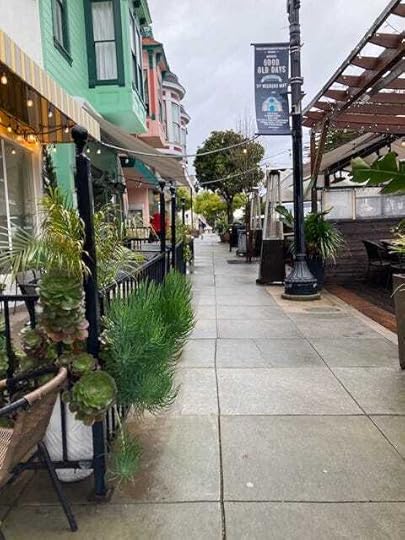
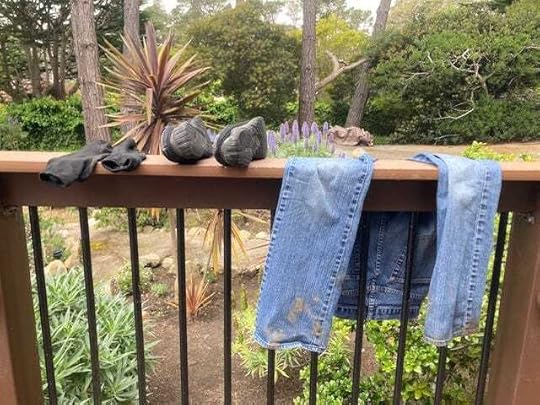

 HAPPY NEW YEAR
HAPPY NEW YEARThanks for reading C. Lee McKenzie ! Subscribe for free to receive new posts and support my work.
December 18, 2024
Tic Tock

Hello Dear Readers!
This week I’m sharing a seasonal short story. It’s new…so new that the ink isn’t dry yet. I hope you enjoy it, and if you do, I hope you’ll subscribe to my Substack and come back for more stories or bookish bits each Wednesday. And now for Tick Toc.
Dora Scott is unexceptional in every way but two. She’s never late. She’s never early. Dora has a precision about arriving at appointed times that put Swiss trains to shame. Out of habit, her neighbors, Mr. March, Miss Clifford, and Troy Sanderling set their watches when she exits her front door and again in the evening when she returns from her job at the accounting firm.
This persistent punctuality sometimes annoys the three, who are less tied to the clock, but Dora’s a quiet woman. She keeps a tidy yard and never makes any noise, unlike others on their cul de sac. Dora may be quirky, they agree, but she’s a decent neighbor--and useful. They’re never uncertain about the time.
It’s early evening, and here she comes—her steps measured and precise as she walks from the bus stop. 5:41 p.m.
Mr. March resets his old stove clock.
Miss Clifford takes out her frozen dinner and turns on the oven.
Troy Sanderling doesn’t bother checking the time. When Dora arrives home it’s when he needs to leave for his session at the gym.
At her porch, Dora pauses briefly to adjust the wreath before noticing a small package propped against the wall and not much bigger than her hand. She picks it up and reads the label.
Strange. There’s no return address and only her name is written across the brown paper. Christmas is a few days away, so perhaps someone has gifted her. She glances around as if she might find one of her neighbors peeking from a window--a secret Santa.
Inside her kitchen, she reads the back of the package.
OPEN IMMEDIATELY!
Oh, no. She hopes it isn’t something alive. That would be terrible. She’d have to care for it and there’s no time for that.
Carefully, she unties the string, removes the wapping, and sits on the kitchen stool, shocked. This is the most beautiful gift box she’s ever seen. It sparkles as if it’s filled with stars. She reads the tag attached to the ribbon and gasps.
Tic Tock. Tick Tock. Tic Tock.
What does this mean? There is no signature, so whoever wrote this and took such care to wrap the gift remains a mystery. Dora holds the box close to her ear. She doesn’t hear anything, and when she gently shakes it, nothing shifts inside. Taking care to peel away the glittery paper and ribbon, she opens the box and stares at the contents.
A clock that fits in her palm--a diminutive one encased in ornate gold filigree that weaves around a most exquisite jade face and forms an intricate pedestal. When she holds a magnifying glass to it, those twisted gold shapes are numbers. It concerns her that its form is odd. She’s sure it’s meant to sit squarely on a surface, but the angles are slightly off, so when she places it on the table, it leans.
In its presence, she is both delighted and apprehensive. Despite its beauty, something is troubling about this clock. She’s tempted to rewrap it and try to return it, but she doesn’t know to whom.
It must be someone who knows about her clock collection and her love for rare timepieces. So, instead of trying to ferret out the gift-giver, she makes space among her treasures. As she steps back to admire it, the new addition begins to tick.
Tic Tock. Tick Tock. Tic...Tock.
The irregularity of that final Tic Tock annoys her and seems to be louder than the regular ticking. Perhaps the clock needs adjusting or cleaning. She’ll stop it until she can attend to that.
But the clock won’t stop, and the off-beat Tic Tock becomes louder and louder. No matter what she tries--re-boxing it, plugging her ears, moving it to the farthest corner of the house…Tick Tock. Tick Tock. Tic…Tock.

That week, Dora sleeps off and on, unable to mask the annoying clock sound. In the mornings, she’s so tired that she gets up much later than usual. Even though she rushes, she misses the bus.
That week, Mr. March doesn’t arrive at his dentist appointment when he should and must pay even though he didn’t have the scheduled cleaning.
That week, Dora’s late to work… every day.
And Miss Clifford fails to meet her fiancé as scheduled for three important dates. She can’t believe he hooks up with someone else while waiting for her and cancels their engagement.
That week, Dora misses three appointments with an important client. He fires the firm.
And Troy Sanderling is late to several training sessions at the gym, so his annoyed trainer refuses to reschedule until next month--if then.
That week, the clock continues with a damnably delayed and very loud Tic Tock.
One night, Dora arrives home after dark, having missed her bus yet again. She enters her house to the terrible ticking sound.
Desperate, she carries the clock to the garage. Her last resort. The hammer. She doesn’t stop until the filigree is scattered bits, the jade face obliterated. Standing back, breathless, Dora listens.
Blissful silence.
Back in her house she removes all of her clocks from the shelves and stores them in a large trunk.
The next day she quits her job and says goodbye to her neighbors. They’re sad to see her go.
As Mr. March says, “I found a much better dentist thanks to you”.
Miss Clifford goes so far as to hug Dora. “You saved me from a disastrous marriage. I discovered my friends didn’t like him but held their tongues until we broke up.”
Troy Sanderling loves his new workout regime. “I do it at home now, and I’m saving a lot of money.”
In the next months, Mr. March, Miss Clifford, and Troy Sanderling enjoy Dora’s postcards from around the world—all at odd times of the year and never with any regularity. Christmas cards, birthday cards are either early or late, but each is full of Dora’s adventures. In her last message, she writes, “I adopted the most beautiful puppy.”
Thanks for reading C. Lee McKenzie ! Subscribe for free to receive new posts and support my work.
I don’t have paid subscriptions right now, but if you enjoy my writing, I hope you’ll buy one of my books. And this week, there are several FREE. Here’s one: https://www.smashwords.com/books/view/204548
December 11, 2024
The Messenger

When he hears the dead calling, he runs. Not away from their voices but toward them. They want help in reaching someone on this side, and that’s his job. Connecting the dead with the living.
He’s The Messenger.
His busiest time of the year is All Hallows Eve, but this year, there has been a sharp increase in demands during Christmas. This puzzles him. It’s almost as if there’s an urgency to use his services before the end of the year. He hasn’t had time since December arrived to sort out the cause because he no sooner patches up one relationship for a departed and desperate human when another plea comes in on the hotline.
He’s seated in his office when his cell rings with the special tone for the dead. He quickly picks it up from his desk.
“Yes? The Messenger here. How may I help you?” There is no answer. “Hello? Anyone on this call?” Only static comes through the headset. “Look, this number is for my special clients, so kindly hang up and keep this—”
“Messenger, be still and listen.”
“Who are you and what do you need?”
“It is you who are in need.” The voice is low, almost a growl, not human, neither dead nor alive.”
The Messenger clears his throat. “What…do you…mean?”
“Look at your calendar.”
Click.
With the phone still to his ear, he stares at the house-shaped advent calendar that arrived gift-wrapped the first of the month. Something from one of his satisfied clients, he assumed. He hasn’t opened any of the flaps. He hasn’t had time, but this is the only calendar in the house, except for the digital one on his computer. He pulls that one up and scrolls through the thirty-one days. There is nothing unusual, only the names of those who have called his hotline, along with the dates of their deaths and their requests.
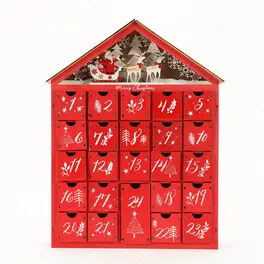
He reaches out and opens December 1 on the small red house. Behind the flap is the number 30. When he opens December 2, 29 glitters back at him.
A strange advent calendar, he thinks. There are no wintry scenes or holiday wishes. Finally, he opens December 3, today’s date, and while the number 28 is there, it’s in a heavy font with ragged edges. In one corner, a skeletal finger points to the 28.
“What kind of joke is this?”
Quickly, he flips through the rest of the days. Each date is darker. Each date has the ominous skeletal finger until he comes to the 31st. He hesitates, but then opens that last small paper door.
RIP Messenger-1965-2024.
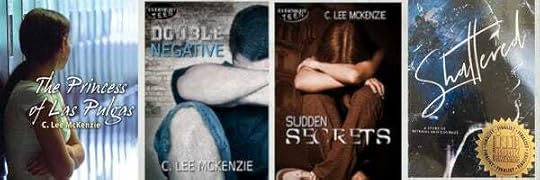
All my books are on Amazon. You can support my writing by buying a book. You can boost my visibility by reviewing those you read. Thank you. Thank you. Thank you.
Thanks for reading C. Lee McKenzie! This post is public so feel free to share it.
Thanks for reading C. Lee McKenzie! Subscribe for free to receive new posts and support my work.
December 4, 2024
The History Ghost, Part 3...and

C. Lee McKenzie, Author Central
In part 2 the ghost whose name is Dr. Moody, visits Miles again and this time explains that he’s in charge of the History Error Department. Some “bumbler” from the Dark Ages has made a lot of mistakes, and he’s trying to correct them on his scroll with ink and a quill pen. When Miles says he doesn’t think history’s that important, Dr. Moody says, “Without knowing what has been done in the past, young man, how are you to judge what to do in the present?”
Part 3Miles thought about what Dr. Moody had just said. “Sorry, but I don’t get it.”
The man shook his head and glanced around the room. He picked up HotRod magazine from the desk. “Hmmm. Here’s another way to think about that. Do you know the saying ‘necessity is the mother of invention’?”
“When you need something you make it?”
“Right. Well, if we didn’t have history to preserve our inventions, we wouldn’t have progress. We’d be reinventing things we need every few decades. A case in point.” He held up the magazine. “If the internal combustion engine had to be reinvented every decade because we’d forgotten that it existed or how it was made, this”—he pointed at the hot rod Miles had circled, the metallic red with orange and yellow flames lapping the sides.—“would not be here.”
That next week Miles opened his history text first every night. He read the chapters, answered the questions, and even asked some in class. When the next test came he aced it, and that night he hoped Dr. Moody would reappear just so he could show him his A.
But the doctor didn’t return that night or the next. It was over a month before the room turned chilly again and Dr. Moody entered scratching on his scroll, the paper trailing behind him even longer than before.
Miles leapt out of bed. “I’ve been waiting to show you this.” He held the test paper out.
“This pleases me greatly. Good work.” Dr. Moody rubbed his eyes and sighed. “But now I must return to my duties. I’m behind more and more and there are no assistants being appointed as I’ve requested. OhdearOhdear.”
“You know, I’ve been thinking about inventions, Dr. Moody. How is your history scroll organized?”
Dr. Moody explained there were four columns. Names (Persons: Places: Things of importance). Dates, of course. Brief Descriptions, using words that the History Librarian would recognize. “Here,” he pointed to the last column, “is a place for notes.”
“You know, there’s a program that might help you,” Miles said.
“I don’t understand,” Dr. Moody said.
“You enter that data and if there’s a mistake, it’s easy to correct.” Miles pulled up his data management program on the computer and demonstrated it. This should save you tons of time. Want to give it a try?”
They worked together until Dr. Moody got the hang of data entry and until Miles couldn’t keep his eyes open any longer and crept into bed.
The next morning, Dr. Moody was gone, but on Miles’ desk sat the ink bottle and the quill pen along with a note. “You’ve made history perfect. My deepest appreciation, Dr. Elias Moody.
At dinner that night, after they’d toasted Miles’s A on his second history test, the conversation went back to Marne’s shopping and boyfriends, then onto Victoria’s braces that had to happen in a few years.
Nothing was different from all those other dinner conversations until his dad said, “I still can’t figure out how one day that textbook is riddled with inconsistencies and wrong dates and in the next it’s not.”
Miles smiled and lifted his glass of milk in another toast. To inventions and history.
The End
Thanks for reading C. Lee McKenzie Books! This post is public so feel free to share it.
My love of history showed in this little tale. I hope my soapbox tone didn’t drive you nuts! And now about driving readers nuts, let’s consider this month’s IWSG’s question.

The awesome co-hosts for the December 4 posting of the IWSG are Ronel, Deniz, Pat Garcia, Olga Godim, and Cathrina Constantine!
Every month, we announce a question that members can answer in their IWSG post. These questions may prompt you to share advice, insight, a personal experience or story. Include your answer to the question in your IWSG post or let it inspire your post if you are struggling with something to say.
Remember, the question is optional!
December 4 question - Do you write cliffhangers at the end of your stories? Are they a turn-off to you as a writer and/or a reader?
No. I only use cliffhangers at the end of chapters. I like my stories tied up with all the threads of the plot resolved and the characters at a place of new beginnings. I have left some of what I hope are tantalizing possibilities in the one middle-grade series I wrote (The Adventures of Pete and Weasel), but even those books can be read as stand-alone stories. Let’s see what others in this group have to say about cliffhangers.
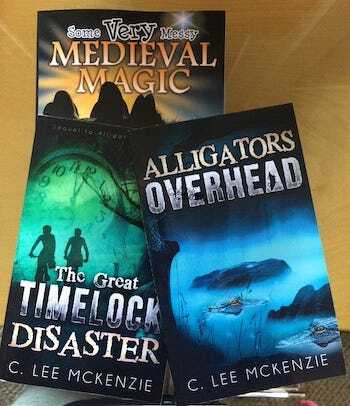
Quote of the week: “Those who cannot remember the past are condemned to repeat it." Attributed to philosopher George Santayana.
Thanks for reading C. Lee McKenzie Books! Subscribe for free to receive new posts and support my work.
November 27, 2024
The History Ghost, Part 2

In Part 1 Miles has been visited by a strange little man who, when he appears, drops the room temperature to freezing. This only makes Miles edgier since he’s already under pressure to bring his history grade up or face the loss of his summer vacation. He’s just sat down to check his email and try to settle his nerves.
There were more messages than usual. Lots of stuff about the substitute teacher for gym and the English test on Friday. Lots of replies to his questions about Hot Rods. By the time he’d finished, it was after ten. He cracked his history book and skimmed the chapter on the Pilgrims, making notes that would get him through tomorrow’s lesson. The extra credit would have to wait until tomorrow night.
Miles closed his notebook and kicked off his tennis shoes. He was pulling his shirt off when the room turned into a refrigerator. Miles halted with his arms in the air, his shirt over his head. Then, inching the shirt down to his chin, he peeked out .
The same little man stood in the middle of the room. Scratchity. Scratchity went his feathered pen across the scroll. Then he dipped the quill into the floating ink bottle all the while muttering and shaking his head.
“This is simply not working. NoNoNo. I must have—” The man stopped and looked up. “It’s you again. The rude boy. What are you doing here?”
“I live here?” Miles hadn’t meant it to be a question, but that’s the way it came out.
“Hmmm. Odd.” The man rolled the paper scroll, scanning the lines. Rolling more until he found what he was looking for. “1999. That’s this year, am I correct?”
Miles cleared his throat. “No. 2024.”
“Not possible. NoNoNo. You are mistaken.”
“Not.” Miles crossed his arms, mostly because he was freezing but also because he needed something solid to hold on to. The pressure of a new school, a new town, an F looming in history had finally gotten to him. He was in the middle of what Aunt Beckie called a nervous breakdown.
“How is it that you are so terribly rude?”
“Rude?” I act pretty darned good, Miles thought. I don’t cuss unless I stub my toe. I don’t strangle my sisters. Don’t cheat on tests. I just don’t study. So why is this guy going on about me being rude?
“Ahem.” The man cleared his throat. It appears that I have made a miscalculation, and it is indeed 2024.” He swept his arm across his middle and bowed.
“Hey, not a problem.” Miles didn’t quite know what to do with a bowing man, holding a quill pen and a scroll while an ink bottle danced next to his ear. But he didn’t feel scared anymore, just cold. “Mind if I pull on a sweater? You’re giving me frostbite.”
The man ignored him—dip scratchity, scratchity. dip —went the quill. “Indeed. Another error.” He looked up. “Perhaps, I’m the rude person. Let me introduce myself. Dr. Elias Moody.” The man bowed again.
“Miles Stanley.” Miles almost bowed.
Dr. Moody scrolled quickly until paper piled high around his legs. “There it is. That’s the mistake.”—dip scratchity. “Another correction.” He smiled. “I appreciate your assistance.”
“I hate to be nosey, but who are you?” Miles asked.
“YesYesYes. I suppose I should explain. I’ve been so preoccupied with this and that and then of course…that.” He pointed to a line on his scroll. “I’ve been put in charge of the Error Department.”
Miles waited. He didn’t want to jump in and have Dr. Moody accuse him of being rude again. But when he understood that there was no more explanation coming, he asked, “What Error Department?”
Something like shock washed across Dr. Moody’s face. “The History Error Department, of course.”
“Of course.”
“You’ve never heard of us?”
Miles shook his head slowly. “No.”
Dr. Moody placed his quill in the ink bottle and rolled the paper up from the floor. “I correct errors in recorded history. I took the job over after some bumbler from the Dark Ages. The man knew nothing of his profession and he made all kinds of mistakes. Well, the committee should have known better. I mean the Dark Ages!” He sighed. “It will be centuries to rectify all of his mistakes.”
“So it’s important…to get the history just right?”
Dr. Moody stared at Miles as he might if a kangaroo had suddenly hopped into the room. He cleared his throat. “In a word, yes. It’s as important to mankind as history itself.”
“Why?” Miles regretted that question as soon as he asked it. Dr. Moody stood unmoving, his eyes closed, the scroll clutched tightly in his hands as if he were struggling not to turn it into a weapon. “I take that back. It’s just I’m not good at history. I’m failing it in fact.”
Dr. Moody opened his eyes and stared at him. “Without knowing what has been done in the past, young man, how are you to judge what to do in the present?”
I ran out of writing time—Thanksgiving and all that entails got between me and my computer, so instead of two parts, I’ll have to go for three. :-( Will you bear with me and return for Part 3 next Wednesday? I hope so.
Thanks for reading C. Lee McKenzie Books! This post is public so feel free to share it.
Here are some of my other young reader books. They were so much fun to write!
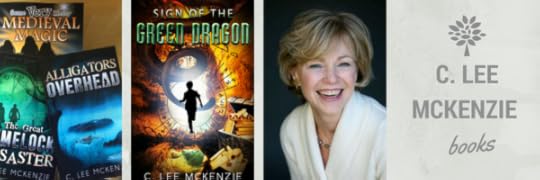
Thanks for reading C. Lee McKenzie Books! Subscribe for free to receive new posts and support my work.
November 20, 2024
The History Ghost, Part 1
Sometimes, I enjoy writing for young readers. It’s a different kind of challenge than writing for adults. Here’s a piece I’ve almost finished. I’ll publish it in two parts, to give myself some time to get the ending right.

“F? What kind of grade is that?” His dad stabbed the test paper with his finger.
Miles had prayed through dinner that his parents would forget to ask about the history test. His sister, Marne, took up most of the conversation with her mall report, and for a change, he hadn’t pretended to gag. He hadn’t even crossed his eyes.
Just keep ‘em busy, Marn, he prayed silently, fixing his eyes on his dinner plate and yumming over Mom’s chicken.
Victoria, the sister who arrived seven years ago and ruined his life, ruined this night as well. “Guess what?” she said between bites of chicken. “I got an A on my arithmetic paper.”
Miles dropped his fork with a clatter and stared into his dad’s eyes which were suddenly fixed on him. Little Miss Prodigy with her A was the drumroll of doom for Miles because in the next minute, Dad asked what his problem was, then where his history test was, then…
Now his dad leaned back in his chair, the paper with a dark red F clutched in his hand. “I thought we had an understanding about this, Miles.”
Oh no, the I’m-disappointed-in-you look. Anything but that. Miles slid lower in his seat. Why did he have to be the only kid in the seventh grade with a dad who taught history at the college? Why did he have to be the only one who hated history? He sat through his dad’s dinner table lecture, nodded in the right places, looked miserable as he knew he should, then scuffed his way out of the room with his eyes glued to the carpet.
His dad’s voice followed him into the hall. “Get that grade up, or the computer goes, the telephone goes, and so does your summer vacation.”
Miles climbed the three flights of stairs to the back room he’d claimed as his when they’d moved into this old house at the beginning of this term. His room wasn’t light. It didn’t have a view of the lake. And because there was no closet, neither of his sisters was the least bit interested in it.
He’d chosen it because of where it was. As his dad always said, “The house is not important. It’s always location, location, location.” Miles agreed. Once in his room he didn’t have to dodge Marne, the sixteen-year-old Miss I Know Everything. And Victoria didn’t like to climb higher than two stories, so she didn’t nose through his stuff.
The room had one problem and he couldn’t figure out how to fix it. Every so often it became as cold as a refrigerator. Then just as quickly, it warmed. This always happened when he was under the sheets and nearly asleep, so he’d pull up the extra blanket from the end of the bed and burrow under the covers.
When he told his mom about the cold that came and went, she shrugged and said, “These old Victorians have strange drafts. I’ll ask your dad to look at the heater vent in your room.” As far as he knew, Dad hadn’t looked at anything, so the problem remained.
That night when Miles got to his room, his ears still rang with his dad’s scolding. He went to his desk and shuffled through his homework pile. Math done. English almost done. History totally not touched. But who cared what happened to the Colonists in 1600? He tossed the F paper on top of his books. He’d work on his assignment later.
Pulling his car magazine from the middle desk drawer, he flipped the pages. HotRods. Now this is important. In an article, he found a website that looked interesting and logged on. He scrolled down through the ads. So many beauties. Page after page of Chevys and Fords, chopped, channeled. The ones with the flames were his favorites.
When he glanced at the clock on his computer screen he couldn’t believe it was after eleven. How had he lost track of so much time? He had to get some sleep, but he still hadn’t opened his history book.
As he stretched up from his chair, the room temperature dropped and the skin on his arms turned to goosebumps. When he looked behind him, a strange man stood near the door to his room. Miles flattened against the wall next to his desk, his breath coming in short pants, his eyes riveted on the figure across the room.
The man’s hair curled around his head like a gray cloud. In one hand, he held a scroll, the paper spooling at his feet. In his other, he clutched a quill pen. As he raised his hand, an ink bottle appeared, then floated into the air and stayed at his side. He dipped the pen into the bottle and then scratchety, scratchety went the quill across the scroll.
“Oh mymymy.” His whispery voice seemed to come from a great distance, not just a few feet away. “This will never do. NoNoNo.” He dipped his pen into the floating ink bottle again and crossed out several lines.
“What . . . are . . . you doing here?” Miles finally managed to stammer.
The man glanced up. “How rude you are, young man. Where are your manners?”
“But—”
“Now you’ve interrupted my thoughts and I’ll have to go over this whole bit and I’ll be late with the submission. I’ve told them this is a job for three, not one, and here I am once more behind schedule. OhdearOhdearOhdear.” Without looking at Miles again, the man scribbled quickly as he walked, dragging the scroll beside him. When he reached the wall he walked through it as if it weren’t there.
Miles sat in his chair with a thump, his eyes fixed on the spot where the man had been only a second before. The room temperature became normal and soon he stopped shaking from the cold, but he couldn’t stop shaking from what had happened. When he stood, the HotRod magazine slipped onto the floor, unnoticed. Slowly he walked across the room. He stretched his hand out, touching the wood, feeling its solid structure, and at the same time doubting his sanity.
It was late. That had to be the problem. He was tired. He was worried about losing his summer to whatever punishment his dad had in mind if he didn’t get that grade up. Diving into bed, he left the desk light on like he used to when he was five.
After school the next day, Miles didn’t climb the stairs to his room. He sat at the dining room table, spread his homework out, and tackled his easiest subject, math. At dinner, he took seconds and considered thirds. He wasn’t eager to go into that room of his.
Marne had lots to say about some dance and a dress and a guy, so Miles tuned her out. Dad got worked up about all the misprints in his textbook that made a major difference in when past world events happened.
Whatever, Miles thought.
Victoria was coming down with a cold.
Yay! Miles didn’t dare say that out loud.
“So Miles, did you talk to your teacher about extra credit to make up that F?” His dad caught him with his mouthful of potatoes, so he nodded.
“That’s good.” Mom smiled at him. “You can’t fail history in this town. It would not reflect well on your father.”
It was time to escape and the only place to do that was his room. “I’ll get on that assignment right now.” He cleared his plate, stacked it in the dishwasher, and gathered his books.
When he reached the third floor, he faced his door, then turned the knob and pushed. Still standing in the hall, he peered inside. The tumble of bed covers, yesterday’s jeans and shirt, Hotrod magazine still by his chair—everything looked normal. Leaving the door open, he crept toward his desk and eased himself in front of the computer. He’d check his e-mail, and then he’d start that extra credit for history.
Well, Miles seems to have a couple of problems—his history grade, for one, and now a ghost that haunts his room. Are you up for finding out how Miles will handle that grade problem and what this ghost is about? I’ll publish the second part next Wednesday. Thanks for reading. I hope you’ll leave a comment. They’re always interesting and often helpful.
Thanks for reading C. Lee McKenzie Books! This post is public so feel free to share it.
Thanks for reading C. Lee McKenzie Books! Subscribe for free to receive new posts and support my work.
If you like my writing, I have 14 books published. Hope you’ll TAKE A LOOK!
November 13, 2024
The Ribbon Tree

I’m skipping a Thanksgiving-themed story and diving straight into Christmas. At the end, I’ve asked some questions about this story, and, if you have time, I hope you’ll give me some feedback. Here we go…
The Ribbon Tree
Jason Whitaker dreaded this visit home. Sure he wanted to see his mom, but what if she wasn’t holding it together and needed someone to look after her? The answer was simple. His lifestyle would go up in smoke. Goodbye, Malibu, California. Hello, Fish Creek, Montana.
It wouldn’t hurt his brother to step up when Mom needed help, but Stanley—the number one bleeding heart in New York City—argued that his down-and-out clients needed him at the law clinic. That excuse got good old Stanley out of helping with Dad’s funeral arrangements, dealing with the termites at the family home, and almost everything Jason asked him to do.
Stanley was already on the front stoop when Jason stepped out of the car. Jason wondered how long his brother had stood there waiting for him, not brave enough to go inside on his own.
Well, it hadn’t been good last year, Jason had to admit. The call came the day before Christmas. They’d both caught flights home, and when they arrived, they found their mother in her chair next to the Whitaker traditional Ribbon Tree. She’d been a devastated C-curve of a woman, not the ramrod matriarch they both loved and always obeyed.
Recalling that tableau from last year, and fearing that he’d see his mother like that again, he joined Stanley on the porch.
“Been here long?” Jason asked.
“A couple of minutes.”
Jason lifted his hand that was weighed down by a thousand pounds of reluctance and rapped on the door before shoving it open. “Mom!”
Her chair was empty, but he froze in the doorway because the traditional Whitaker tree stood decorated with shimmering gold ribbons the way he remembered from all the Christmases he’d spent in this house. The Ribbon Tree had always been Dad’s project, but it seemed his mom had decided to keep the tradition alive. A dozen candles flickered on the mantel, but unlike the candles that had delighted him as a child, these cast ghostly shadows against the wall. When he peeked into the dining room, the table and Mom’s china gleamed under more candles. All of these decorations were usual, yet not. A chill corkscrewed up his spine.
He sniffed. Roast beef and Yorkshire Pudding.
Stanley shrugged when Jason looked at him with an unspoken question. Mom’s special Christmas dinner wasn’t what either of them had expected, but the cooking smells filtering through the air somewhat eased the tension between Jason’s shoulder blades. He shook off the uneasiness. He was just tired from the flight and worried about his mom’s mental state. From what he’d seen…and smelled so far, Mom was okay. He was off the hook for extended Mom care. Even Stanley managed a smile that looked like relief.
“In here boys.” Her voice came from the kitchen.
She stood guard at the stove, the oven door open and the steamy aroma of perfectly roasted meat and baked pudding pouring into the room. She’d tied the candy cane stripped apron at her waist and wound her salt and pepper hair at the back of her head into a tidy knot. At sixty-five, she still had a slim figure, and her keen eyes sparkled the way they always had. That vacant look of last year had disappeared.
“Your timing is perfect.” She hugged them to her, then set about directing them to uncork the wine and slice the roast while she dished up the whipped potatoes, set the puffed Yorkshire puddings on a plate, and tossed the salad. When Dad was here, he’d do the carving, but now that job fell to Jason, and he tried to remember how it should be done. His mom was a stickler for well-presented plates, especially during the holidays.
Once at the table, Jason reached for the mashed potatoes, but his mother shook her head. “Has California made you forget to be thankful?”
“Sorry.” Jason bowed his head while his mom said a short prayer.
“Now, let’s give this a taste test.” She hefted the meat platter, took a slice, and passed it to Stanley..
The only thing Jason missed in Fish Creek was his Mom and her cooking. His brother had to be thinking the same thing the way he inhaled the steam rising from his plate and practically purred.
Stanley should have been a woman, Jason thought, not for the first time. Always soft-footed when he entered a room, a voice so low that people had to lean in to catch what he said. The word delicate flitted across Jason’s mind. Delicate and precise. That was why Dad allowed Stanley, and only Stanley, to hand him the ribbons while he stood on the ladder to reach the top branches of their Christmas tree. Dad had that delicate touch and precision in him, too.
That had been fine with Jason. He’d rather watch football. Ribbons weren’t his thing.
He’d often wondered how two such different people could come from the same genetic material. Jason concentrated on his abs and always had three girls on the string at a time. Stanley’s abs didn’t exist unless you looked very closely. The only exercise he did was to walk up the courthouse stairs. They were both about six feet, but Jason had a square jaw and short dark hair. Styled. Stanley’s jaw receded a bit, and his hair curled around his face in a brown fringe.
So very different, Jason thought.
His fork was halfway to his mouth with a small mound of mashed potatoes when his mother said, “Your father has come home.”
Stanley, who as always, was beatleing his way through his food, one nibble at a time, stopped chewing.
“Say what?” Jason let his fork clatter onto his plate.
“Just what I said. He’s back and he plans to stay.”
Stanley always had a pale complexion, but even with the soft glow of candlelight, his face had turned pasty.
“Surely, you don’t think I could have put up that beautiful tree,” she said. “He didn’t trust me to do it right either, so he did.” She sipped her wine as if she’d just commented on the weather. “I rather like having him back. It’s a comfort.”
Inside his head, Jason’s life exploded. His mom had lost it. He’d have to call work and beg for family leave again. Then there was Kylie and Marian and Jill. Cancel those dates.
“Where is he now?” Stanley’s soto voce question barely riffled the air.
“Upstairs. He didn’t want to shock you, so I was supposed to prepare you.” She looked first at Jason, and then at Stanley. “Are you?”
One didn’t prepare to meet a ghost, and certainly, not the ghost of your father.
“It’s a bit of an adjustment, but so worthwhile. I was terribly lonely, and I didn’t want to move in with either of you. Heaven forbid. This is the perfect solution.”
She walked to the stairs and called, “Malcom! They’re ready.” She looked back at them. “I think.”
I like to know how people read and digest what I write. If you have time, I hope you’ll answer some questions—only the ones that interest you. Thanks!
1. So is she an addled, lonely widow in need of her sons’ help? Or is there a ghost waiting to descend those stairs and blow reality to shreds. What’s your preference?
2. Is Jason self-centered or is he only trying to do what’s right by his mother while making his way in the world?
3. And about Stanley—the do-gooder, except for his family—is he at all likable?
4. The delicacy and precision characteristics that Dad and Stanley share play into a larger piece of this pie, should it ever become a bigger story. Was it distracting or intriguing?

Thanks for reading C. Lee McKenzie Books! This post is public so feel free to share it.
Thanks for reading C. Lee McKenzie Books! Subscribe for free to receive new posts and support my work.
November 6, 2024
The Curse of Havenwood House, Sixth Installment

We’re in the homestretch now. Let’s see what the House has in store for Aurora this week and what The Insecure Writers’ Support Group has in the way of a question for November.
(If you’re interested in the previous installments of this story, here are the links; First, Second, Third, Fourth, Fifth.)
Aurora looked up at the sound of pounding feet on the cellar stairs. She blinked at the sudden brightness. John Garth stood with a blazing torch over his head, his eyes scanning the dim interior until he found her. “Aurora.” He rushed across the room.
“Stay back!” the house screamed.
“Leave,” Aurora said, her voice barely a whisper. “This house always has its way.”
“Not today.” He struck at the machine with his torch. The metal and wires curled like singed tentacles, recoiling from the flames. Sparks skittered along the floor, igniting tiny fires. Ripping Aurora’s cuffs open, he used their sharp edges to hack at the wall that held her captive. The stones cracked, and he yanked her free. “Today, I have my way.”
The room compressed then expanded, hurling the doctor from Aurora. “No. You will never have your way here!” The house shrieked.
Aurora struggled to stand, but she collapsed to the floor. Blood from the wound at her side had seeped into her gown and feathered cape. Drop by drop her life spattered onto the floor. The regular pat, pat, pat came to her from a distance.
“Open your eyes, Aurora.” John Garth’s cooling breath blew across her forehead, and the burning in her body eased. “We can escape him.”
When she looked up, his intense eyes stared down at her. “First, I’m stopping the bleeding.” He quickly set to ripping the hem of her gown. Gently he slipped the fabric around her waist and bound the wound.
“I’ve endangered you,” she said, holding his hand. “I should not have done that.”
“No, you have not. I waited until you chose to free yourself from this place, and then I came. My being here was of my choosing. You are not alone anymore. We can fight this thing, Aurora. And we can win.”
The voice she’d heard in the ballroom was back, and this time, she recognized it as the one she’d always imagined should her gryphon speak to her.
He ran his hand down her bruised arms and leaned close. Her pain eased, her head cleared, and she pulled herself to her feet.
Tremors shot up the walls and across the floor. An overhead support crashed down and struck the doctor across the back. He fell forward onto the stone floor and lay still.
“So nice of you to come, doctor. I will enjoy watching your metamorphosis as much as hers.”
“No!” Aurora stuck out with fists that connected with nothing but air. With unexpected strength, she cast the heavy wood beam from John Garth’s back, then kneeling, pulled him to his feet. All of the small fires scattering along the floor came together in a rush and roared to life around them. Flames shot up the walls, blocking the stairs.
“It’s impossible to escape me,” the house raged.
“Everything is possible now.” She grasped John Garth’s hand. With a nod of agreement, they leapt over the flames and up the stairs. The door at the top slammed in front of them, shuddering the walls.
“You are trapped!” the house screamed.
Aurora looked back into the inferno. “No. It is you who are trapped. Trapped and damned,”
Together, they hurled themselves at the door. Once. Twice. The third time it shattered, and the servants, who huddled in the hallway, fell back in terror, then recovered quickly. Maid Mannerly and Livy flung buckets of water down into the cellar. Cook and Mr. Weebly came from the kitchen with two more.
“Let it burn,” Aurora shouted. “Let this devil die.”
The doctor sought her gaze and held it. “Are you certain this is what you want? We can still stop the fire from spreading to the upper floors.”
“I’m very certain.”
“Then so be it.”
They ran outside with the heat intensifying at their backs and gazed, transfixed, at Havenwood House being swept up in flames. Cook patted her forehead with the handkerchief she always kept tucked in her bosom. Livy, her chin quivering, swiped her eyes. Mr. Webbly wrapped one arm around Miss Mannerly’s shoulders.
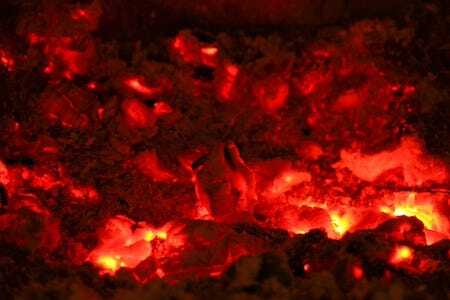
“Come,” Aurora said, “We need to distance ourselves from this pyre.”
They made their way down to where the gryphon had always stood guard over the terraced lavender garden, but now that place was empty.
“No!” She turned in a frantic circle, searching. He could not be gone. He had to be near. The house could not have destroyed her one true friend.
“Aurora.” John Garth took her hand. “All is well. Don’t be afraid.
Looking up into his sharp-featured but beautiful face, she recognized what she’d missed until this moment. He drew her close so her head was pressed to his chest, and the sound of his heart took her back to when she was a child and her gryphon comforted her. Like a conquered phantom, the fear that had possessed her since she could remember vanished.
Along with the others, she returned her attention to the house. Even from this distance, they couldn’t escape the brutal sounds of exploding glass. When flames licked out of the windows, and agonized screams shook the air, they shrank back from the house in its death throes.
The night sky became like dawn when the roof ignited and Havenwood House crumbled into ashes. This moment was payment for the women who had suffered in that joyless house and died before their time. This was the end of that wretched curse handed down from generation to generation.
Her feathered cloak flared out in a rush of wind. John Garth tightened his arm around her shoulder, and she felt the power of the two of them together.
“I’ve wanted to be with you all my life,” she whispered.
“You have always been with me, Aurora, and you always will be.”
The End
Ahhh. Was that sweet or what? So there you have it! What did you think? Did the ending work? I wrote it two different ways but chose this one that was grounded in a touch more reality.
And now for the First Wednesday Question from…

The awesome co-hosts for the November 6 posting of the IWSG are Diedre Knight, Lisa Buie Collard , Kim Lajevardi, and JQ Rose!
Every month, we announce a question that members can answer in their IWSG post. These questions may prompt you to share advice, insight, a personal experience or story. Include your answer to the question in your IWSG post or let it inspire your post if you are struggling with something to say.
Remember, the question is optional!
November 6 question - What creative activity do you engage in when you're not writing?
For one, I read. I think that’s creative. I also love to redesign my garden. It’s so rewarding to make changes in one season and see the results in the next. I do a lot of experimenting in the kitchen. I might start with a recipe, but then I get carried away with, “What if I added…?” Sometimes it works. Sometimes it doesn’t. Cooking is a lot like writing in that way.
Quote of the Month: “A creative life is an amplified life. It's a bigger life, a happier life, an expanded life, and a hell of a lot more interesting life” – Elizabeth Gilbert
Please Share!
Thanks for reading C. Lee McKenzie Books! This post is public so feel free to share it.
Thanks for reading C. Lee McKenzie Books! Subscribe for free to receive new posts and support my work.
October 30, 2024
The Curse of Havenswood House, Fifth Installment

This is the next to last installment of this supposedly "spooky” Halloween story. You can read First, Second, Third, and Fourth by clicking on the links. As I’m coming to the end, I have to ask myself, “Where did this come from, McKenzie?”
Setting aside her mask and lifting the hem of her gown, Aurora searched the walls until she found her way out of the ballroom. Finally reaching the stairs, she mounted the treacherous steps to her room, retrieved the key, and felt her way down to the cellar door.
Her hand shook as she fumbled for the lock, but before she could insert the key, it glided forward on its own. An arrow to the target, it plunged inside. With a click, the door released its vacuum seal, and an updraft swept out of the depths.
She had no time to escape. Filaments wrapped long fingers around her arms, and no matter how much she fought to free herself, it pulled her down into a coldness unlike any she’d ever felt. Behind her, the door slammed closed. The door slammed closed, ending all hope of escape
“At last.” A chilling presence engulfed her. It had no substance, yet it was repulsive.
Aurora kicked. She spat and clawed to free herself, but whatever held her, tightened its grip.
“You chose your prison.” Fetid breath brushed her cheek.
“No! I chose to end this curse and not wait in agony for years.” She shrank away from the sinister laughter that echoed around the room.
“No matter. You are mine now, my dear Aurora.”
“Get away from me, soulless creature!”
She felt a sharp slash like a knife blade at her waist, and pain radiated through her like lightning. A warm flush of blood spilled down her hip.
“Never say that! I’m a soul in torment. Betrayed. Humiliated.”
She fell to her knees and lost consciousness.
When her eyelids fluttered open, she stared into cold inkiness, unable to determine how long she had been here. Her arms ached, spread wide, and manacled to the stone wall. Assaulted by the coppery smell of drying blood, she fought back the bile rising in her throat. Pulling against her restraints only sent stabs of pain through her arms, and she collapsed against the cold wall.
“You are awake, I see.”
“Let me go. I did nothing to deserve your hatred.”
“Oh, you are so terribly mistaken, my dear.”
Something like a hand gripped her by the throat. Death permeated the dank air.
“I was a scientist on the verge of a great discovery when my life was cut short. Dead at only five and thirty. Shoved from the balustrade. Murdered by my loving wife, your great-grandmother, Elenor.” The hand released its grip.
“But...you aren’t dead!”
“I might as well be. I managed to crawl into the cellar in time to save my soul within these stones--something you will soon appreciate.”
For a moment, the only sound was labored, shallow breathing, then the house spoke again.
“You have much of my lovely wife in you. Your great-grandmother was more fire and iron than flesh and blood. The weak-kneed women that preceded you inherited the cowardly nature of dear Elenor’s lover.”
“How can you kill your descendants? What kind of beast are you?”
“You are no descendant of mine! There is not one drop of Havenwood blood in you or the others who came before you. My strumpet of a wife bore me no child.”
A stir of air brought a slowly increasing glow to the room. She gasped at the immense machine wrapped in a cobweb of wire that confronted her in this dim light. It snapped with an electrical charge, filling her nostrils with an acrid smell.
She struggled to free herself, but it was no use.
For a moment, a gentle hand brushed her cheek. “I’ve waited so long.” She shuddered at this new gossamer tone that scarcely masked the predatory one.
“Monster!” She choked back the tears. She would not give this thing the satisfaction of seeing her cower.
It didn’t respond. Instead, an ominous silence grew around her until her ears hummed with it. That silence ended with the snap of an electrical charge. It encircled her, tingling but not painful. Another. This time stronger like sharp needles stabbing her skin.
“Metamorphosis,” the voice hissed. “You are but a girl now. Shortly, you will be changed forever. Like me, you will become a part of this house. The house I built. The house I cherished and planned to pass on to my children. My revenge will be complete with the end of Elenor’s dynasty of bastards.”
“Let me go!” She twisted against the bruising restraints. A punishing wave of electrical pulses flashed through her. The wall at her back softened and like quicksand, drew her in—slowly, slowly—until only half of her body remained outside the wall. “No. Stop!”
“You are just not ready to accept, but you will. It won’t take long. After the pain, the process will be very like a chrysalis releasing a beautiful new form of itself. You will not live in Havenwood House; you will be it. Of course, I’ve only tested this creation on myself, so thank you for letting me confirm its brilliance.”
The machine spat and hissed. Arcs of fire shot around her. She screamed, no longer able to suppress the terror. Her body was on fire, her life draining from her.
Defeated, she lowered her head and waited to die.

What? No, this can’t be right. More writing. More writing. I think nineteenth-century Mary Shelley has influenced me! Also, I adore gryphons, so if I can figure out a way to write about them, I do. Now, I’m off to finish this tale. I hope to see you next week for THE END.
Thanks for reading C. Lee McKenzie Books! Subscribe for free to receive new posts and support my work.



